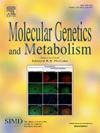Meta-analysis of cognitive outcomes in children and adults with early treated phenylketonuria – Results across functions
IF 3.5
2区 生物学
Q2 ENDOCRINOLOGY & METABOLISM
引用次数: 0
Abstract
Meta-analyses were used to track cognitive outcomes in early treated people with phenylketonuria. We compared impairment sizes and possible modulations by blood Phe in young adults and children/early adolescents.
We identified results for 29 adult PKU groups and 21 child groups (N-participants = 904 and 460; mean age 27 and 11 years; mean current blood Phe: 1010; and 527; median 899 and 494; SD= =396 and 159) with 278 separate outcome measures available for adults and 175 for children.
Results demonstrated a similar overall level of impairment across ages, corresponding to approximately 0.5 of a standard deviation difference from controls. However, children showed more homogeneous impairments across functions compared to adults who showed a larger difference between the most and least impaired measures and a stronger difference of impairment between speed measures (impaired) and accuracy measures (preserved). In both age groups, blood Phe level modulated the effect size of the impairment in several conditions, but speed of processing appeared to be affected more by childhood levels than current adult levels consistent with previous results.
Results indicate that negative effects of PKU persist across the lifespan, but that adults with PKU may rely on relatively unaffected learning skills and on prioritization of resources to achieve good accuracy and good performance in tasks tapping crystallized intelligence, even if speed remains impaired. This has positive implications for educational and employment prospects, but it is unclear how positive trends generalize to the whole PKU population beyond groups engaged in research.
早期治疗苯丙酮尿症儿童和成人的认知结局荟萃分析-跨功能的结果
荟萃分析用于追踪早期治疗的苯丙酮尿症患者的认知结果。我们比较了年轻人和儿童/早期青少年血液Phe的损伤大小和可能的调节。我们确定了29个成人PKU组和21个儿童组的结果(n -参与者= 904和460;平均年龄27岁和11岁;平均当前血Phe: 1010;和527年;中位数899和494;SD= =396和159),成人有278项单独的结果测量,儿童有175项。结果显示,各年龄段的整体损伤水平相似,与对照组的标准差相差约0.5。然而,与成人相比,儿童在功能上表现出更多的同质性损伤,成人在最严重和最轻微的损伤测量之间表现出更大的差异,在速度测量(受损)和准确性测量(保留)之间表现出更强的差异。在两个年龄组中,血液Phe水平在几种情况下调节了损伤的效应大小,但处理速度似乎更受儿童水平的影响,而不是目前成人水平的影响,这与之前的结果一致。结果表明,PKU的负面影响贯穿整个生命周期,但患有PKU的成年人可能依赖于相对未受影响的学习技能和资源的优先级,即使速度仍然受损,也可以在利用结晶智力的任务中获得良好的准确性和良好的表现。这对教育和就业前景有积极影响,但目前尚不清楚这种积极趋势如何推广到除从事研究的群体之外的整个北大人口。
本文章由计算机程序翻译,如有差异,请以英文原文为准。
求助全文
约1分钟内获得全文
求助全文
来源期刊

Molecular genetics and metabolism
生物-生化与分子生物学
CiteScore
5.90
自引率
7.90%
发文量
621
审稿时长
34 days
期刊介绍:
Molecular Genetics and Metabolism contributes to the understanding of the metabolic and molecular basis of disease. This peer reviewed journal publishes articles describing investigations that use the tools of biochemical genetics and molecular genetics for studies of normal and disease states in humans and animal models.
 求助内容:
求助内容: 应助结果提醒方式:
应助结果提醒方式:


